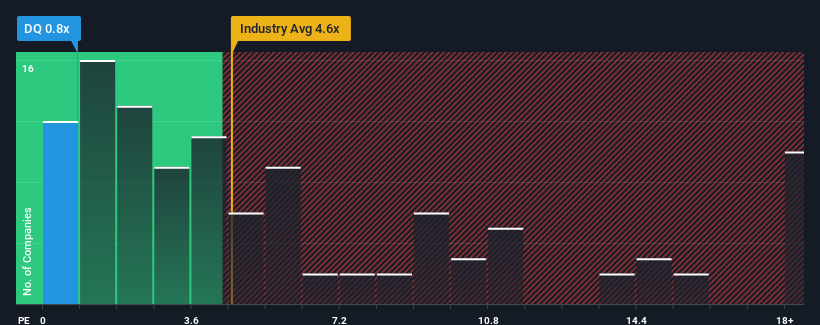- United States
- /
- Semiconductors
- /
- NYSE:DQ
Daqo New Energy Corp. (NYSE:DQ) Held Back By Insufficient Growth Even After Shares Climb 46%
Daqo New Energy Corp. (NYSE:DQ) shares have had a really impressive month, gaining 46% after a shaky period beforehand. Not all shareholders will be feeling jubilant, since the share price is still down a very disappointing 42% in the last twelve months.
Even after such a large jump in price, Daqo New Energy's price-to-sales (or "P/S") ratio of 0.8x might still make it look like a strong buy right now compared to the wider Semiconductor industry in the United States, where around half of the companies have P/S ratios above 4.6x and even P/S above 10x are quite common. Nonetheless, we'd need to dig a little deeper to determine if there is a rational basis for the highly reduced P/S.
See our latest analysis for Daqo New Energy

What Does Daqo New Energy's P/S Mean For Shareholders?
Daqo New Energy hasn't been tracking well recently as its declining revenue compares poorly to other companies, which have seen some growth in their revenues on average. It seems that many are expecting the poor revenue performance to persist, which has repressed the P/S ratio. If you still like the company, you'd be hoping this isn't the case so that you could potentially pick up some stock while it's out of favour.
Want the full picture on analyst estimates for the company? Then our free report on Daqo New Energy will help you uncover what's on the horizon.Do Revenue Forecasts Match The Low P/S Ratio?
There's an inherent assumption that a company should far underperform the industry for P/S ratios like Daqo New Energy's to be considered reasonable.
Retrospectively, the last year delivered a frustrating 50% decrease to the company's top line. Even so, admirably revenue has lifted 242% in aggregate from three years ago, notwithstanding the last 12 months. So we can start by confirming that the company has generally done a very good job of growing revenue over that time, even though it had some hiccups along the way.
Shifting to the future, estimates from the eight analysts covering the company suggest revenue should grow by 12% per annum over the next three years. With the industry predicted to deliver 25% growth per year, the company is positioned for a weaker revenue result.
In light of this, it's understandable that Daqo New Energy's P/S sits below the majority of other companies. It seems most investors are expecting to see limited future growth and are only willing to pay a reduced amount for the stock.
The Bottom Line On Daqo New Energy's P/S
Shares in Daqo New Energy have risen appreciably however, its P/S is still subdued. Using the price-to-sales ratio alone to determine if you should sell your stock isn't sensible, however it can be a practical guide to the company's future prospects.
As expected, our analysis of Daqo New Energy's analyst forecasts confirms that the company's underwhelming revenue outlook is a major contributor to its low P/S. Shareholders' pessimism on the revenue prospects for the company seems to be the main contributor to the depressed P/S. Unless these conditions improve, they will continue to form a barrier for the share price around these levels.
You should always think about risks. Case in point, we've spotted 1 warning sign for Daqo New Energy you should be aware of.
Of course, profitable companies with a history of great earnings growth are generally safer bets. So you may wish to see this free collection of other companies that have reasonable P/E ratios and have grown earnings strongly.
New: Manage All Your Stock Portfolios in One Place
We've created the ultimate portfolio companion for stock investors, and it's free.
• Connect an unlimited number of Portfolios and see your total in one currency
• Be alerted to new Warning Signs or Risks via email or mobile
• Track the Fair Value of your stocks
Have feedback on this article? Concerned about the content? Get in touch with us directly. Alternatively, email editorial-team (at) simplywallst.com.
This article by Simply Wall St is general in nature. We provide commentary based on historical data and analyst forecasts only using an unbiased methodology and our articles are not intended to be financial advice. It does not constitute a recommendation to buy or sell any stock, and does not take account of your objectives, or your financial situation. We aim to bring you long-term focused analysis driven by fundamental data. Note that our analysis may not factor in the latest price-sensitive company announcements or qualitative material. Simply Wall St has no position in any stocks mentioned.
About NYSE:DQ
Daqo New Energy
Manufactures and sells polysilicon to photovoltaic product manufacturers in the People’s Republic of China.
Flawless balance sheet with high growth potential.
Similar Companies
Market Insights
Community Narratives



